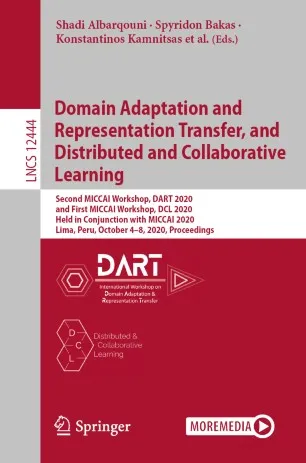Domain Adaptation and Representation Transfer, and Distributed and Collaborative Learning: Second MICCAI Workshop, DART 2020, and First MICCAI Workshop, DCL 2020, Held in Conjunction with MICCAI 2020, Lima, Peru, October 4–8, 2020, Proceedings
4.0
Reviews from our users

You Can Ask your questions from this book's AI after Login
Each download or ask from book AI costs 2 points. To earn more free points, please visit the Points Guide Page and complete some valuable actions.Introduction
"Domain Adaptation and Representation Transfer, and Distributed and Collaborative Learning" is an expertly curated volume capturing cutting-edge research from two significant workshops held in conjunction with MICCAI 2020: the Second Workshop on Domain Adaptation and Representation Transfer (DART 2020) and the inaugural Workshop on Distributed and Collaborative Learning (DCL 2020). Convening the latest ideas within these rapidly evolving fields, the book presents profound insights into how machine learning and artificial intelligence aim to solve prominent challenges in medical image analysis, particularly in the context of domain adaptation, representation learning, and collaborative training paradigms.
Each chapter includes methodologically rigorous investigations and real-world applications pivotal to bridging gaps between neural networks, domain-specific constraints, and medical imaging pipelines. The book caters to a global audience, ranging from researchers and practitioners to students interested in advancing their knowledge within the domain of AI-driven healthcare solutions. By addressing key challenges such as dealing with scarcity of labeled data, cross-domain knowledge transfer, and distributed training systems, it envisions inclusive and scalable workflows for medical imaging tasks.
Detailed Summary of the Book
The book is divided into two parts, each focusing on the two core themes of the workshops: "Domain Adaptation and Representation Transfer" and "Distributed and Collaborative Learning."
The first part elaborates on challenges in adapting machine learning models from one domain to another while ensuring precision and robustness. Medical imaging inherently faces unique challenges, such as variations in imaging devices, patient demographics, and clinical settings. Researchers in this segment delve into state-of-the-art domain adaptation techniques, highlighting transfer learning, adversarial learning, and contrastive feature representations. Empirical studies on multi-institution datasets affirm the pivotal role of domain adaptation methodologies in enhancing generalizability across diverse healthcare scenarios.
The second part of the book pivots to distributed and collaborative learning. With increasing global efforts to democratize artificial intelligence within medical imaging, this section provides innovative solutions toward collaborative workflows, including Federated Learning (FL). It discusses frameworks for training models across distributed, multi-institution datasets while preserving privacy. Several contributions explore challenges like ensuring fairness in collaborative systems, addressing data heterogeneity, and scaling collaboration for medical AI applications.
Embedded throughout the chapters is a commitment to rigorous statistical evaluation, reproducibility, and modular design of the proposed approaches. The use of medical imaging datasets in real-world scenarios, encompassing modalities such as CT, MRI, and microscopy images, brings practical relevance to the theoretical advancements.
Key Takeaways
- Practical demonstration of domain adaptation techniques such as adversarial learning, knowledge distillation, and self-supervised learning within medical imaging.
- Comprehensive frameworks and protocols for implementing Distributed and Collaborative Learning using Federated Learning, driving robust AI solutions for multi-institutional settings.
- Detailed case studies validating the importance of scalable AI in solving challenges associated with limited labeled datasets in healthcare.
- Insights into ethical, legal, and operational aspects of deploying AI systems that involve collaborative workflows, particularly in healthcare.
Famous Quotes from the Book
"The true promise of artificial intelligence in healthcare lies not in isolated innovation but in collaborative and adaptive intelligence across stakeholders."
"In medical imaging, where precision and generalization cannot be compromised, domain adaptation serves as the bridge towards realizing universal applicability in AI solutions."
Why This Book Matters
As the field of artificial intelligence matures, its applications in medical imaging expand, but so do the challenges of implementing scalable, adaptable, and ethical solutions. This book is an essential compendium for researchers and practitioners seeking to address these challenges systematically. By converging domain adaptation, representation learning, and distributive collaborative models, this book sets the foundation for next-generation AI systems in healthcare.
Furthermore, by tackling critical bottlenecks like data scarcity, model bias, and privacy concerns, the works presented in this book go beyond academic exploration. They propose tangible solutions that can potentially transform medical workflows globally. With its focus on cross-domain interoperability, distributed frameworks, and privacy-preserving methodologies, this book positions itself as a pivotal resource amidst the evolving AI-medical landscape.
Whether you are a student embarking on your journey in medical AI, an academic exploring groundbreaking research opportunities, or a practitioner keen on developing deployable solutions, this book encapsulates theoretical rigor and practical relevance, making it an invaluable resource.
Free Direct Download
You Can Download this book after Login
Accessing books through legal platforms and public libraries not only supports the rights of authors and publishers but also contributes to the sustainability of reading culture. Before downloading, please take a moment to consider these options.
Find this book on other platforms:
WorldCat helps you find books in libraries worldwide.
See ratings, reviews, and discussions on Goodreads.
Find and buy rare or used books on AbeBooks.


